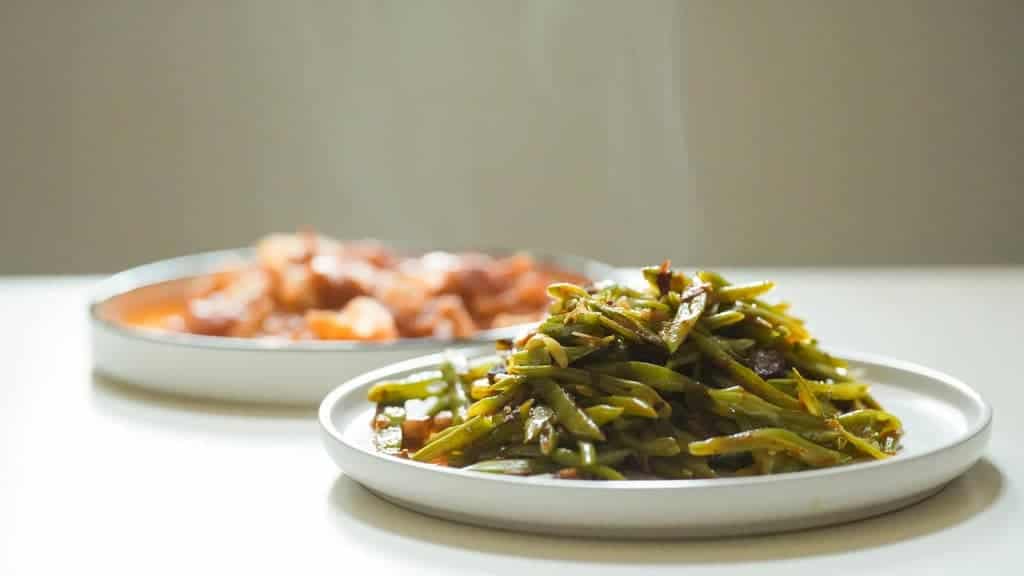As adults, we either are striving to find both the most nutritious and delicious way to eat our fruits and vegetables. Or, we probably avoid most of them altogether. There lies the billion-dollar scientific question: which is a healthier way to prepare vegetables? And, which improves gut health?
Some diets swear by the natural, raw version. And others swear by boiling, steaming, microwaving, or roasting. Even your most stubborn anti-vegetable eaters will eat them fried. Part of that question is, which is more nutritious and which is better for our gut health? A recent study has scientists revealing how cooked food is better for your gut health than raw food.
This information directly opposes what nutrition experts shared in recent years, as the raw food movement swept around the globe. You can look on Instagram or Facebook and see thousands of pictures and accounts about raw foods. While some raw foods are better for you, we will go over the impact of cooked foods on gut health below.
Does food preparation change their benefits?
As much as we may wish we could, there is no denying the health benefits of fruits and vegetables on gut health. They offer the benefits of vitamins, minerals, fiber, carbohydrates, antioxidants, and beta carotenes. There is such a large selection to choose from with various textures, flavors, and colors to enhance any plate.
Preparing vegetables can also be diverse. When I was growing up, putting sauces on our veggies was the best way to ensure someone ate their vegetables. It was even better to dunk raw vegetables into ranch dressing or another dip. As I became older, I reduced that to some salt and butter. Those are just enhancements, however. As the study of nutrition has become more in-depth, the importance of their cooking preparation has taken a more significant role. You’ll be happy to know that each of the methods has its pros and cons, but the vegetable is still amazing!
Cooking methods and their effect on food
Before getting into cooking methods, let’s examine eating raw vegetables vs. cooked. A study was published in the British Journal of Nutrition in 2008. The study included 198 candidates who started a diet, eating 95% of raw foods, primarily fruit. The results showed an increase in beta carotenes but a decrease in lycopene levels.
A study in 2009 demonstrated that each cooking method did decrease certain antioxidant levels in various vegetables while increasing them in others.
When it comes to retaining nutrition, fat-soluble Vitamins A, K, D, and E kept more water-soluble vitamins like Vitamin C. Furthermore, Vitamin C is one of the worst at retaining its potency when cooked. Fortunately, you can get a lot of vitamin C from fruits, which are best eaten raw anyhow.
One definite advantage of cooking vegetables is that it decreases their mass by reducing their water content. Why is this good? It condenses the amount, so you are eating more vegetables when they are cooked than raw. Just think about spinach. You can try and eat a bag of spinach in a salad, or you can cook it down to a simple cup.
Regardless of the method, consuming veggies improves gut health.
Boiling, blanching or steaming foods
- Blanching vegetables: The process of bringing water to a boil, dropping vegetables in for just a moment until it starts to change color, and then pulling them out. This process is used mostly to enable fresh vegetables to be frozen for later use. It also rids the food of tannic acid and phytic acid.
- Boiling vegetable: Process of bringing water to a boil and cooling the vegetables to the desired tenderness. Whether done in a pot or a slow cooker, the result is the same. It results in the most significant loss of antioxidants and nutrients of 15-25%.
The good news is that it also results in the most extensive loss of antinutrients, such as goitrogen. Goitrogen is found in kale and broccoli. It is also responsible for potentially exasperating thyroid conditions. Another chemical released is oxalates, a common cause of kidney stones.
Loss of nutrients during boiling does not hold for all vegetables. Carrots, for example, actually increased in antioxidants after boiling. Vitamin A also retains itself better in boiling than in frying, sun drying, or fermenting.
Boiling also makes it easier for those with IBS, GERD, or other intestinal disorders to digest vegetables as they have difficulty with fibrous foods.
- Steaming vegetables: Placing vegetables in a sieve-like container above boiling water and letting the steam cook the vegetables. It is an excellent way to preserve nutrients and antioxidants. It is advised by some to add some oil to the fat-soluble vegetables to enhance their nutrient absorption.
Roasting, baking, or microwaving food
- Roasting or Baking: The process of cooking vegetables in the oven at a high temperature, usually with a little oil to prevent sticking. This method was found to preserve nutrient value and antioxidants very highly.
- Microwaving vegetables: Placing vegetables in a container and cooking in the microwave. Cooking vegetables in a microwave has received a bad rap for no reason. Microwaving showed to be very good at retaining nutritional value and antioxidants. The main vegetable that suffered greatly from microwaving is cauliflower. In fact, it loses almost 50% of its nutrients which could decrease gut health benefits.
While there are better ways to prepare vegetables, the main thing to look at is:
- Are you looking to increase antioxidants specifically or primarily nutrient value?
- Do you have specific digestive or thyroid concerns that make the method more critical?
- Could you eat various vegetables prepared all ways throughout the week and balance out the losses?
- Will you eat the vegetables prepared that way? If not, who cares. Just eat your veggies!
Retaining microbes in cooking can amplify gut health
A recent study at UC San Francisco and Harvard examined the effect of cooking vs. eating raw food has on microbes or healthy bacteria in our gut. This study is one of the first to address this slant. The experiment began with rats. The scientists chose to feed the rats lean beef and sweet potatoes in both raw and cooked form. Surprisingly, there were no changes in raw vs. cooked meat. The sweet potatoes demonstrated a surprising difference.
The study showed that uncooked sweet potatoes demonstrated damage to the gut bacteria. Some evidence showed a change in how the carbohydrates metabolized and certain compounds that usually are destroyed in the cooking process, which prevent this from occurring.
The scientists continued the experiment with white potatoes, corn, peas, carrots, and beets. Each vegetable had a different reaction from the other in regards to being cooked or raw and the effect on gut bacteria. The starchy vegetables had the most considerable changes, while beets and carrots didn’t create much difference.
The scientists then progressed to running a small study using people. For three days, a few people ate similarly cooked and raw foods. They provided stool samples during this time. Surprisingly, even in such a short amount of time, they documented a difference. The results for the people did differ from the rats, however.
Final thoughts about how cooked food is better for your gut health than raw food
It will be interesting to see more information in the future about how our cooking methods can alter how our gut bacteria respond. For those with digestive issues, this could prove to be a significant insight into better eating methods to alleviate the symptoms. I’m sure that a continuation of the study in the future will include if that is what impacts the nutritional value or antioxidant value during digestion. For now, we must remain fascinated by the fact that scientists have revealed how cooked food is better for our gut health.


















